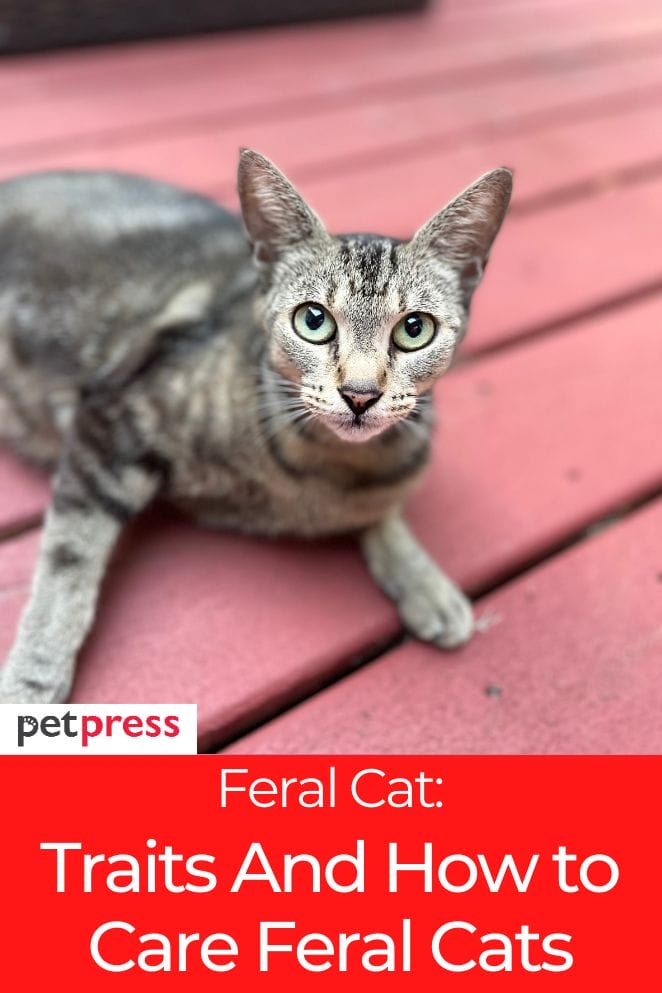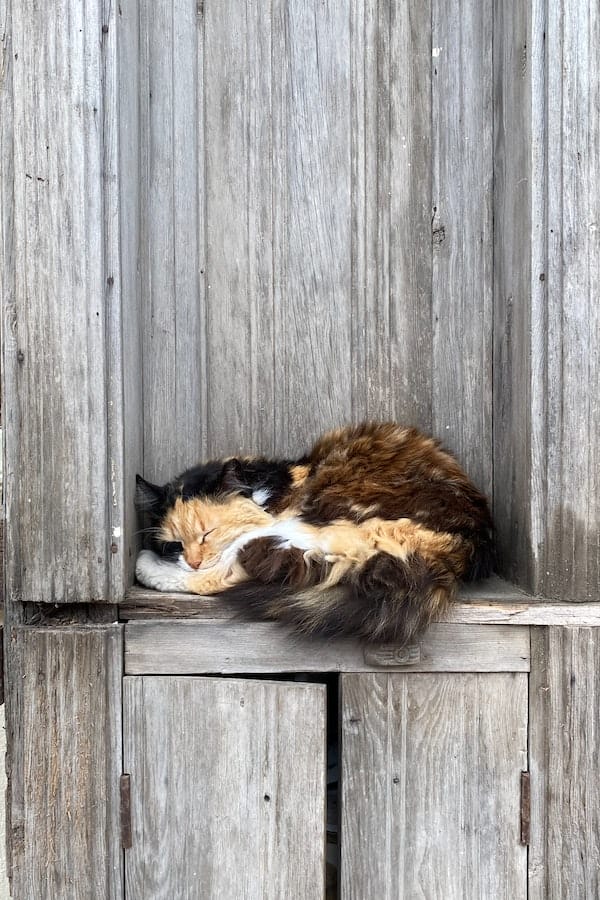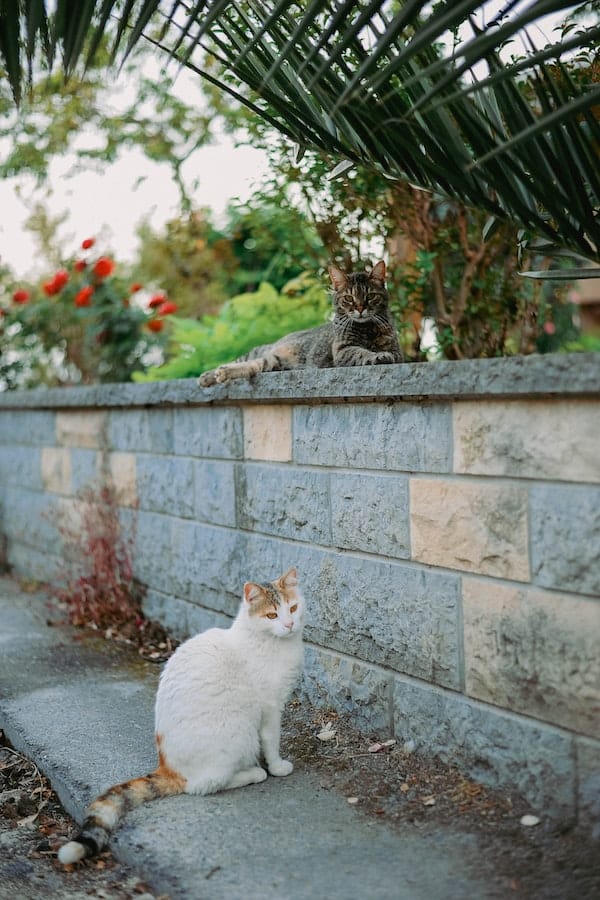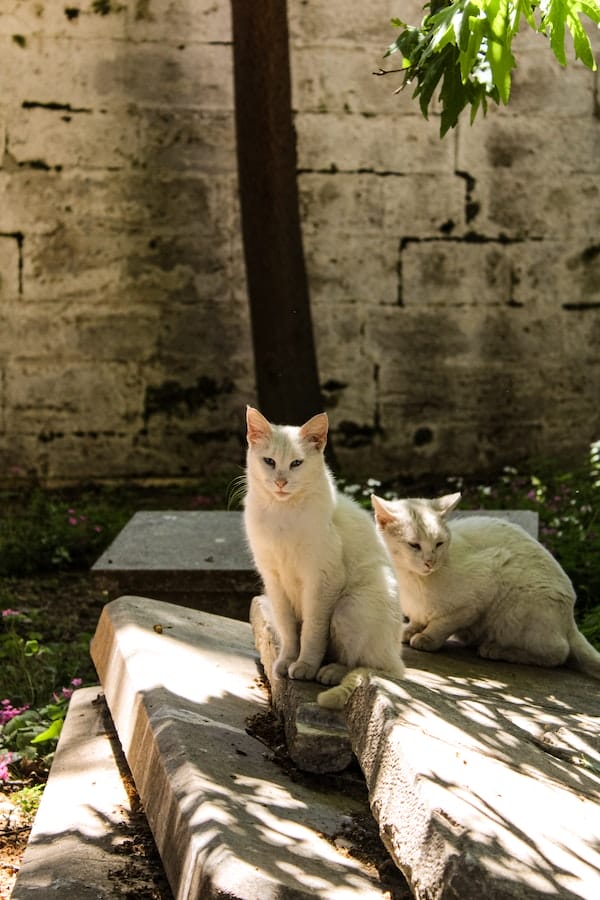
A feral cat is an unowned domestic cat (Felis Catus) that lives outdoors and avoids human contact.
They are typically found in urban or rural areas, living off of available food sources such as garbage, small mammals, birds, and whatever else they can scavenge.
Feral cats are often mistaken for wild cats, but they are actually domestic cats who have reverted to a wild state due to a lack of human interaction.
Feral cats are usually seen as nuisances by many people and often live in colonies, surviving with the help of each other.
What are the traits of feral cats?

There are a few traits that are common amongst feral cats. These includes:
Shy and elusive
Feral cats are extremely shy and elusive by nature. They will generally avoid contact with humans and keep a distance from them.
Feral cats may hiss, snarl, or even swat at people if they feel threatened or cornered.
These cats have had little to no human exposure and thus have learned to stay away from people to survive.
As a result, they are rarely seen by people and are often very difficult to capture.
Highly territorial
Feral cats are highly territorial animals, especially when it comes to other cats. They will fiercely defend their territory from intruders, which can result in fights between cats.
Feral cats may also mark their territory with urine or scratching posts to ward off unwanted visitors.
People must be aware that feral cats can become aggressive if they feel threatened. They are not dangerous, but it is best to leave them alone and observe from afar.
Excellent hunters
Feral cats are excellent hunters and can survive on very little food. They typically hunt small mammals and birds, though they may also eat insects, eggs, and fruit if available.
Feral cats are adept at finding food in urban or rural areas, often relying on scavenging for sustenance if necessary.
They have even been known to hunt in teams, increasing their chances of success.
Highly adaptable

Feral cats are highly adaptable and can survive in various climates and environments.
They can adjust to different temperatures, find shelter when necessary and seek out food wherever possible.
Additionally, feral cats can recognize potential threats and hazards to keep themselves safe. This helps them survive in the wild despite the many dangers they may face.
They are usually nocturnal
Feral cats are usually nocturnal, meaning they’re most active at night.
During the day, they typically hide in dark places such as under bushes or buildings and only come out to hunt when it is dark.
This helps them stay out of sight of potential predators that may be lurking during the day.
Being nocturnal also helps feral cats find adequate food sources, as many small mammals and birds are also active at night.
Live in colonies
Feral cats often live in colonies, meaning the group for survival.
This helps them stay safe from predators and increases their chances of finding food.
These colonies are typically made up of related cats, such as a mother and her kittens or siblings from the same litter.
It is not uncommon to see larger colonies with dozens of cats, all helping each other survive.
Cannot be easily tamed
Feral cats are not easily tamed due to their lack of human interaction and socialization.
Although some feral cats can become more comfortable around humans with time and patience, most will remain timid and skittish no matter how much contact they have with people.
It is important to remember that feral cats cannot be domesticated and will remain wild if left in their natural environment.
More disease-resistant
Feral cats are generally more resistant to diseases than domestic cats, as they have had to evolve to survive.
This means that feral cats may better cope with illness and parasites than their domesticated relatives.
Feral cats also have natural immunity due to their ability to adapt to their environment, which helps protect them from disease.
However, it is still important to take precautionary measures when dealing with any type of cat, whether feral or domestic.
High rate of overpopulation
Unfortunately, feral cats have a high rate of overpopulation due to their lack of human interaction.
Unneutered feral cats reproduce quickly and can produce multiple litters in a relatively short time.
This can lead to large colonies of cats, many of which may not receive adequate care or nutrition.
It is important to practice responsible pet ownership and spay/neuter animals to prevent the overpopulation of cats, both feral and domestic.
How to care for feral cats?

Caring for feral cats can be challenging, but it is essential to do what you can to help these animals.
1. Provide food and water for the cats in a safe place.
2. Spay/neuter feral cats to prevent overpopulation.
3. Create shelters or provide blankets during colder months if possible.
4. Educate yourself about how to safely interact with feral cats and any local laws regarding them.
5. Find a local animal rescue organization to help with medical care, relocation, and more.
6. Avoid trying to domesticate feral cats, as it often frustrates both the cat and the human involved.
7. Support feral cat programs that provide resources such as food, veterinary care, and spay/neuter services in your area.
Final thoughts
Feral cats are a unique part of our ecosystem and deserve to be respected and cared for.
While it may be difficult to interact with these animals, there are many ways we can help them thrive.
By providing food, shelter, veterinary care, and spay/neuter services, we can help reduce their numbers and improve the lives of these cats.
Additionally, educating yourself on responsible pet ownership and understanding the importance of spay/neuter services can help prevent overpopulation and ensure that feral cats have a better quality of life.
With the right care and resources, we can work together to create a more humane environment for all animals.
- Does Cat Litter Melt Ice? The Complete Guide to Winter Safety - January 30, 2026
- Happy Tail Dogs: Understanding This Common Canine Condition - January 29, 2026
- How Cold Can Outdoor Cats Handle? Feline Winter Safety - January 27, 2026


GIPHY App Key not set. Please check settings